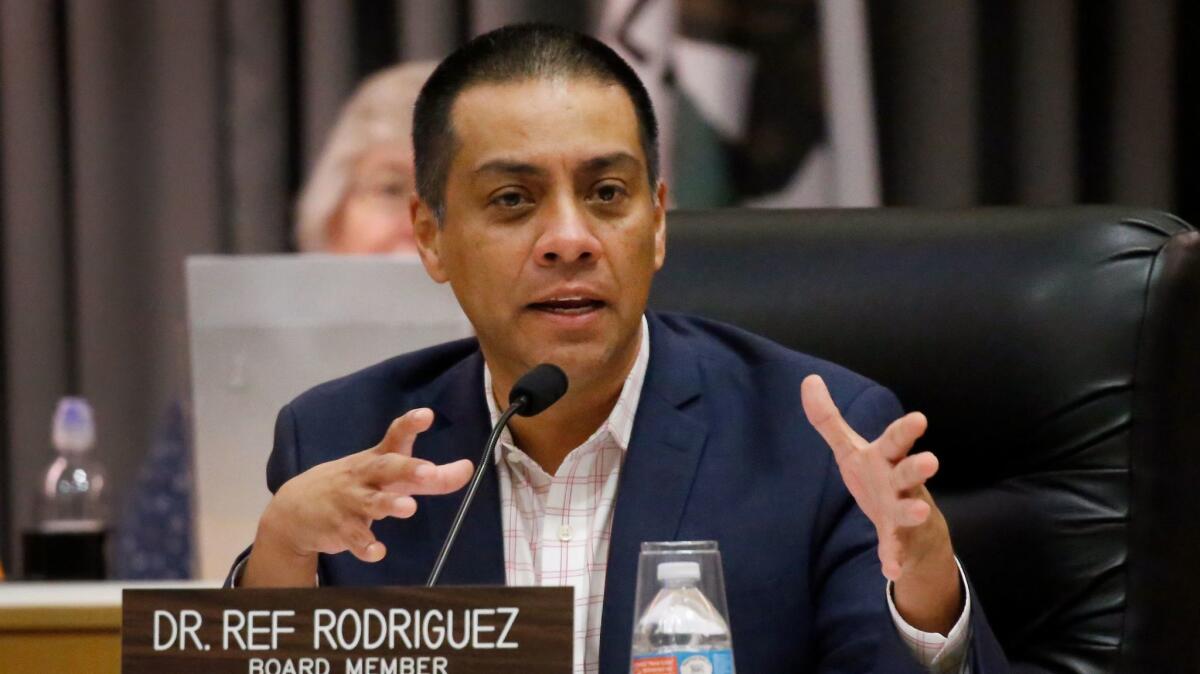Agreement paves way for L.A. Unified to approve most old and new charter schools

- Share via
Charter school leaders flexed their new muscle with the L.A. Unified School District on Tuesday to win district concessions on some operating rules. But they stopped short of insisting that all their demands be met, which could have led to school closures and an embarrassing public fight.
Sixteen charters had risked being shut down when they indicated they would refuse to follow district rules. But the deal, announced at Tuesday’s meeting by acting Supt. Vivian Ekchian, led to recommended approvals for most of them.
A key win, according to charters, is that they will no longer be forced to choose L.A. Unified as the agency that will oversee or provide services to disabled students. They should also find it easier to reach long-term agreements for space on district-owned campuses.
Most significantly, perhaps, is that administrators of the nation’s second-largest school system committed to reviewing district policies and recommending which ones should and shouldn’t apply to charter schools. Those recommendations will then be voted on by the Board of Education, which for the first time has a majority elected with substantial funding from charter school backers.
L.A. Unified has more charters than any other school system. They enroll more than 110,000 students, about 19% of the district total.
The fight between the charters and L.A. Unified was over language the district has required charters to agree to in their petitions, which function as five-year operating agreements. Charters that don’t abide by the clauses can be revoked. Over time, the language has expanded in length and complexity, and even includes a blanket provision to follow district policies. What this meant in practical terms is unclear because state law exempts charters from broad provisions of the education code. Charters operate independently under their own boards of directors.
“The charters were agreeing to policies that they never knew existed, and it was this moving target,” said board member Nick Melvoin, a recently elected member of the new majority who worked with his staff behind the scenes to reach the compromise. “This was a group of adults coming together on all sides to put kids first.”
That’s not how everyone saw it.
At a news conference before the meeting, a teachers union-organized group of parents and teachers called for an end to “the unregulated environment that charter operators and their lobbyists protect at all costs,” United Teachers Los Angeles said in a news release.
Their speakers also called on board member Ref Rodriguez to recuse himself from voting because he faces political money-laundering charges and separate conflict-of-interest allegations from his tenure heading the charter network he co-founded. He did not respond Tuesday, though he has denied wrongdoing.
Rodriguez did not abstain — but happily for charter backers, the deal they crafted did not rely on his vote.
Ekchian introduced the compromise with a brief statement asserting that the district’s oversight responsibility and requirements were undiminished, including the authority of the district’s inspector general to investigate charters. Charter leaders had wanted that role circumscribed.
“No changes were made to the district’s language pertaining to public accountability or student and staff safety or to language pertaining to the Office of Inspector General’s purview,” Ekchian said.
With that, the district’s recommendation on 11 charters changed from no to yes, which paved the way for a 7-0 board vote in favor of the staff recommendations. The charter groups that benefited were Alliance College-Ready Public Schools, KIPP LA Schools, STEM Preparatory Schools and Equitas Academy Charter Schools.
In all, 30 of 33 charters won approvals. Some were never controversial. Given the district’s willingness to make some concessions, the board majority was disinclined to go against any staff recommendations. That left three charters out in the cold.
A language-immersion charter was turned down in part because the district objected to a requirement that students arrive knowing more than one language. The North Valley Military Institute was denied because of financial issues and low academic achievement, even though its leaders argued it deserved credit as a second-chance school for troubled students.

The board renewed one campus run by Magnolia Public Schools, but rejected another, Magnolia Science Academy 5 Lobos, because of low test scores. Magnolia Chief Executive Caprice Young argued that performance suffered two years into the previous operating agreement, after the district said it could no longer provide classroom space in Hollywood. The best available option was a campus in Reseda, but no students from the former campus made the move to west San Fernando Valley three years ago.
Given more time, Magnolia Lobos could have recovered from the disruption, with achievement comparable to other Magnolia campuses, said Young, a former L.A. school board member.
Rodriguez briefly defended Magnolia, but voted with his colleagues to approve all the staff recommendations.
Young will appeal the decision to the L.A. County Board of Education, which already oversees two Magnolia schools and can choose to become the school’s authorizer.
Board members who are not part of the new majority were less than delighted about the last-minute deal. George McKenna expressed concern about holding charters accountable now that they have new five-year agreements. He and Scott Schmerelson complained about being left out of the true decision-making process, which they said involved only the members of the majority bloc.
“Board member participation has been limited to a certain group and that should not be,” Schmerelson said.
More to Read
Sign up for Essential California
The most important California stories and recommendations in your inbox every morning.
You may occasionally receive promotional content from the Los Angeles Times.











